Report on Personal and Professional Growth in Healthcare
VerifiedAdded on 2020/10/04
|14
|4157
|182
Report
AI Summary
This report provides a detailed analysis of personal and professional development within the context of health and social care, specifically referencing the Wellington Health and Social Care organization. It explores the importance of personal values and principles, cultural influences, and the impact of developmental changes on employees. The report further examines developed skills, short and long-term goals, and the creation of a development plan, including its evaluation. It delves into various professional relationships, methods for resolving conflicts, and the legal and ethical considerations surrounding the use of ICT. The report concludes by addressing the minimization of barriers to effective teamwork and the contribution of individuals to collective team effectiveness. Throughout, the report emphasizes the significance of continuous learning and development to meet organizational objectives and improve service delivery.
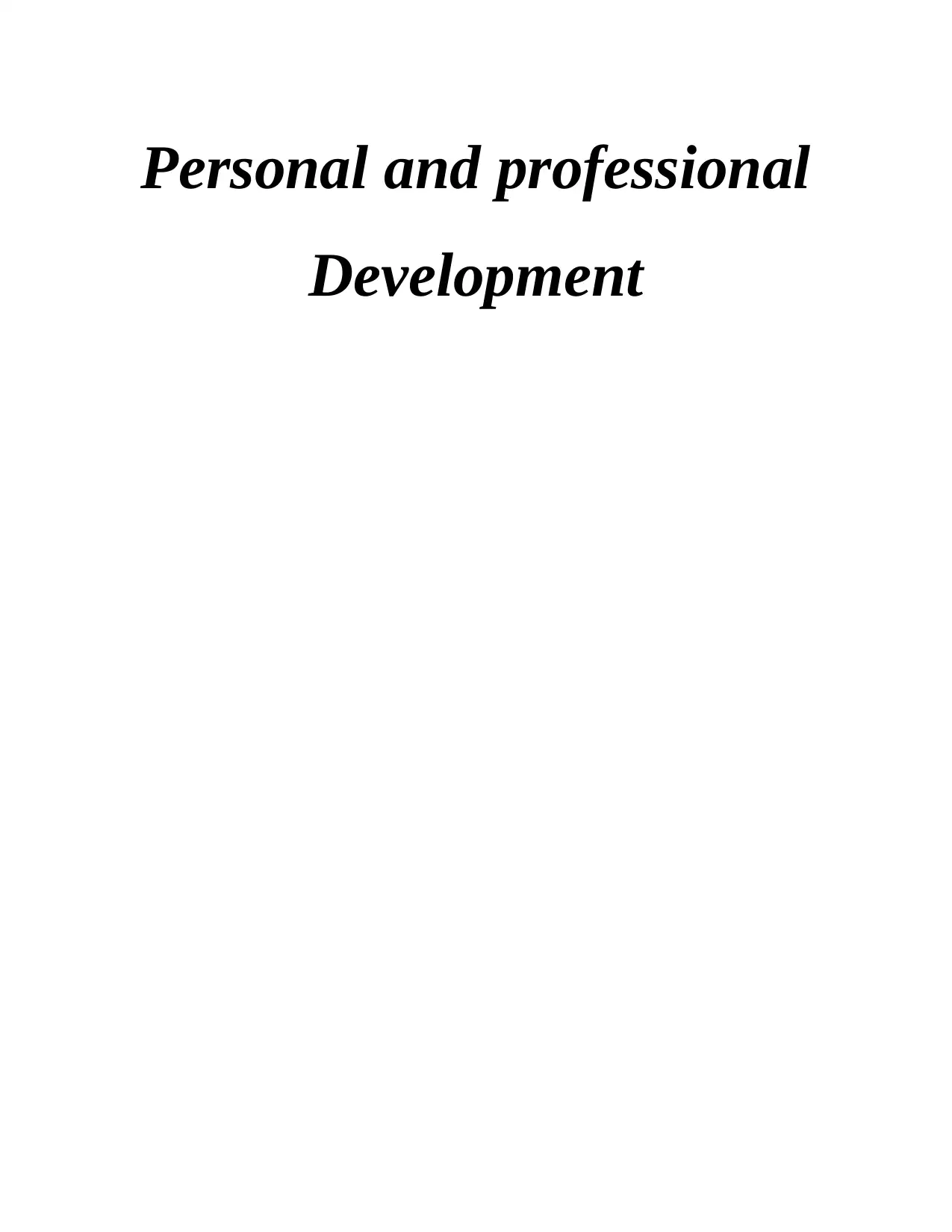
Personal and professional
Development
Development
Paraphrase This Document
Need a fresh take? Get an instant paraphrase of this document with our AI Paraphraser
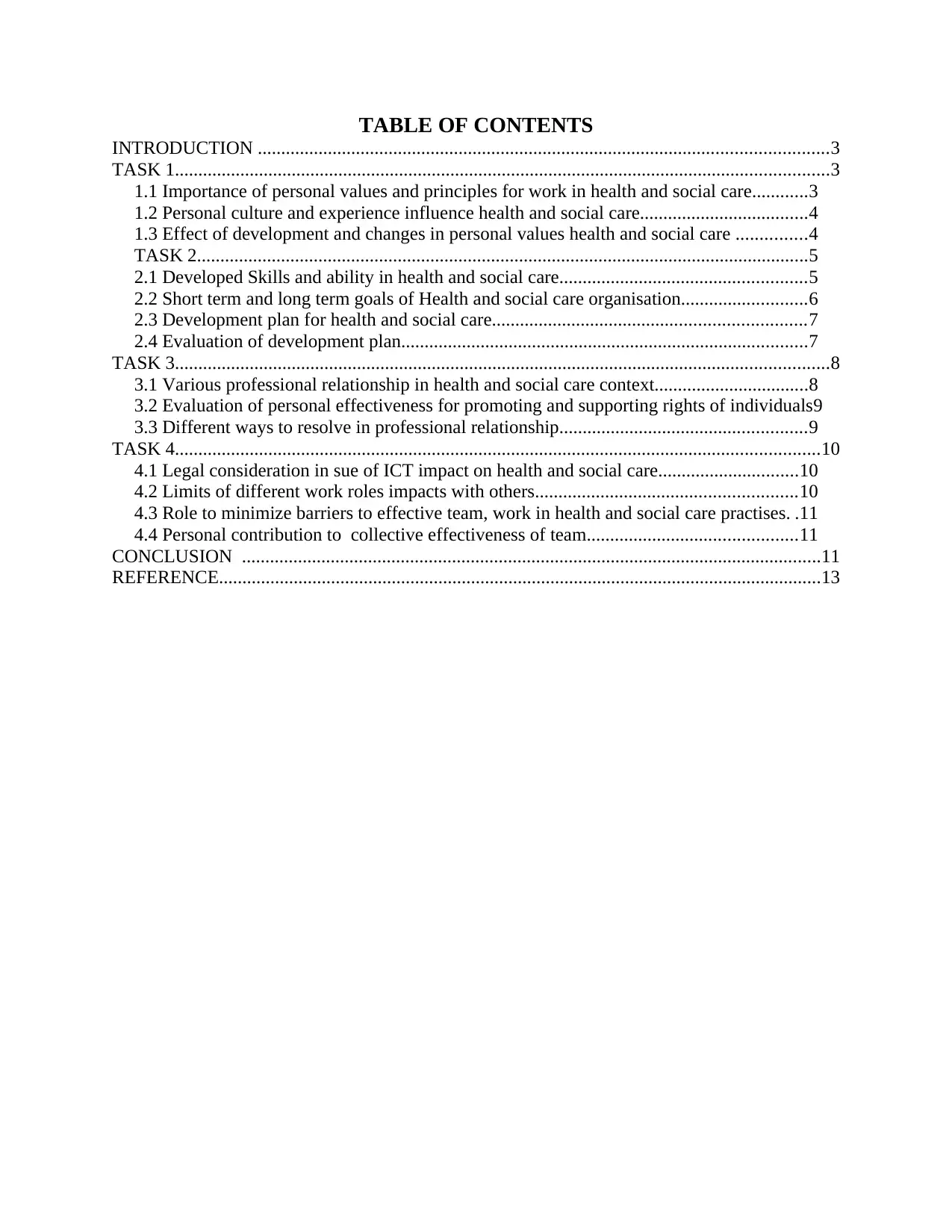
TABLE OF CONTENTS
INTRODUCTION ..........................................................................................................................3
TASK 1............................................................................................................................................3
1.1 Importance of personal values and principles for work in health and social care............3
1.2 Personal culture and experience influence health and social care....................................4
1.3 Effect of development and changes in personal values health and social care ...............4
TASK 2...................................................................................................................................5
2.1 Developed Skills and ability in health and social care.....................................................5
2.2 Short term and long term goals of Health and social care organisation...........................6
2.3 Development plan for health and social care...................................................................7
2.4 Evaluation of development plan.......................................................................................7
TASK 3............................................................................................................................................8
3.1 Various professional relationship in health and social care context.................................8
3.2 Evaluation of personal effectiveness for promoting and supporting rights of individuals9
3.3 Different ways to resolve in professional relationship.....................................................9
TASK 4..........................................................................................................................................10
4.1 Legal consideration in sue of ICT impact on health and social care..............................10
4.2 Limits of different work roles impacts with others........................................................10
4.3 Role to minimize barriers to effective team, work in health and social care practises. .11
4.4 Personal contribution to collective effectiveness of team.............................................11
CONCLUSION ............................................................................................................................11
REFERENCE.................................................................................................................................13
INTRODUCTION ..........................................................................................................................3
TASK 1............................................................................................................................................3
1.1 Importance of personal values and principles for work in health and social care............3
1.2 Personal culture and experience influence health and social care....................................4
1.3 Effect of development and changes in personal values health and social care ...............4
TASK 2...................................................................................................................................5
2.1 Developed Skills and ability in health and social care.....................................................5
2.2 Short term and long term goals of Health and social care organisation...........................6
2.3 Development plan for health and social care...................................................................7
2.4 Evaluation of development plan.......................................................................................7
TASK 3............................................................................................................................................8
3.1 Various professional relationship in health and social care context.................................8
3.2 Evaluation of personal effectiveness for promoting and supporting rights of individuals9
3.3 Different ways to resolve in professional relationship.....................................................9
TASK 4..........................................................................................................................................10
4.1 Legal consideration in sue of ICT impact on health and social care..............................10
4.2 Limits of different work roles impacts with others........................................................10
4.3 Role to minimize barriers to effective team, work in health and social care practises. .11
4.4 Personal contribution to collective effectiveness of team.............................................11
CONCLUSION ............................................................................................................................11
REFERENCE.................................................................................................................................13
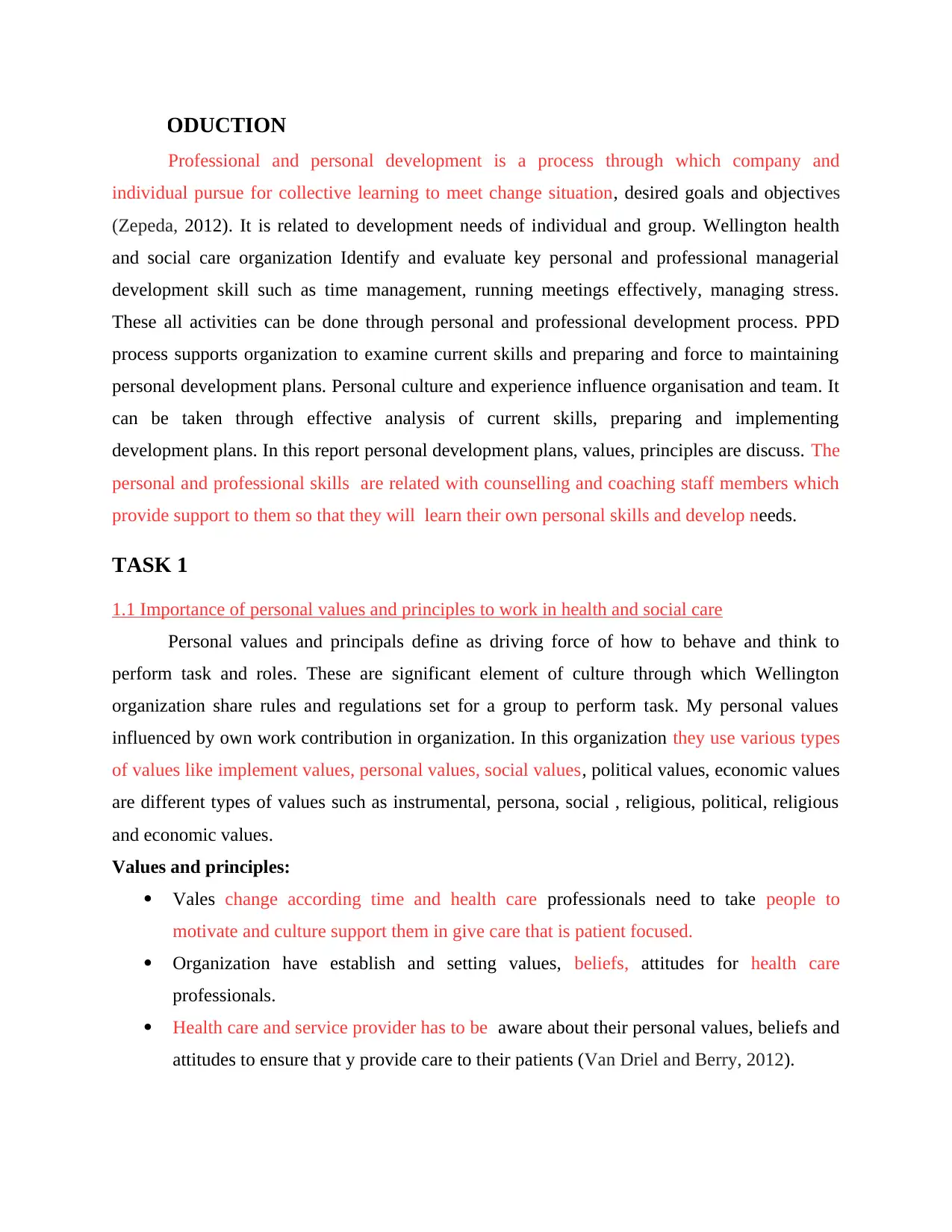
INTRODUCTION
Professional and personal development is a process through which company and
individual pursue for collective learning to meet change situation, desired goals and objectives
(Zepeda, 2012). It is related to development needs of individual and group. Wellington health
and social care organization Identify and evaluate key personal and professional managerial
development skill such as time management, running meetings effectively, managing stress.
These all activities can be done through personal and professional development process. PPD
process supports organization to examine current skills and preparing and force to maintaining
personal development plans. Personal culture and experience influence organisation and team. It
can be taken through effective analysis of current skills, preparing and implementing
development plans. In this report personal development plans, values, principles are discuss. The
personal and professional skills are related with counselling and coaching staff members which
provide support to them so that they will learn their own personal skills and develop needs.
TASK 1
1.1 Importance of personal values and principles to work in health and social care
Personal values and principals define as driving force of how to behave and think to
perform task and roles. These are significant element of culture through which Wellington
organization share rules and regulations set for a group to perform task. My personal values
influenced by own work contribution in organization. In this organization they use various types
of values like implement values, personal values, social values, political values, economic values
are different types of values such as instrumental, persona, social , religious, political, religious
and economic values.
Values and principles:
Vales change according time and health care professionals need to take people to
motivate and culture support them in give care that is patient focused.
Organization have establish and setting values, beliefs, attitudes for health care
professionals.
Health care and service provider has to be aware about their personal values, beliefs and
attitudes to ensure that y provide care to their patients (Van Driel and Berry, 2012).
Professional and personal development is a process through which company and
individual pursue for collective learning to meet change situation, desired goals and objectives
(Zepeda, 2012). It is related to development needs of individual and group. Wellington health
and social care organization Identify and evaluate key personal and professional managerial
development skill such as time management, running meetings effectively, managing stress.
These all activities can be done through personal and professional development process. PPD
process supports organization to examine current skills and preparing and force to maintaining
personal development plans. Personal culture and experience influence organisation and team. It
can be taken through effective analysis of current skills, preparing and implementing
development plans. In this report personal development plans, values, principles are discuss. The
personal and professional skills are related with counselling and coaching staff members which
provide support to them so that they will learn their own personal skills and develop needs.
TASK 1
1.1 Importance of personal values and principles to work in health and social care
Personal values and principals define as driving force of how to behave and think to
perform task and roles. These are significant element of culture through which Wellington
organization share rules and regulations set for a group to perform task. My personal values
influenced by own work contribution in organization. In this organization they use various types
of values like implement values, personal values, social values, political values, economic values
are different types of values such as instrumental, persona, social , religious, political, religious
and economic values.
Values and principles:
Vales change according time and health care professionals need to take people to
motivate and culture support them in give care that is patient focused.
Organization have establish and setting values, beliefs, attitudes for health care
professionals.
Health care and service provider has to be aware about their personal values, beliefs and
attitudes to ensure that y provide care to their patients (Van Driel and Berry, 2012).
⊘ This is a preview!⊘
Do you want full access?
Subscribe today to unlock all pages.

Trusted by 1+ million students worldwide
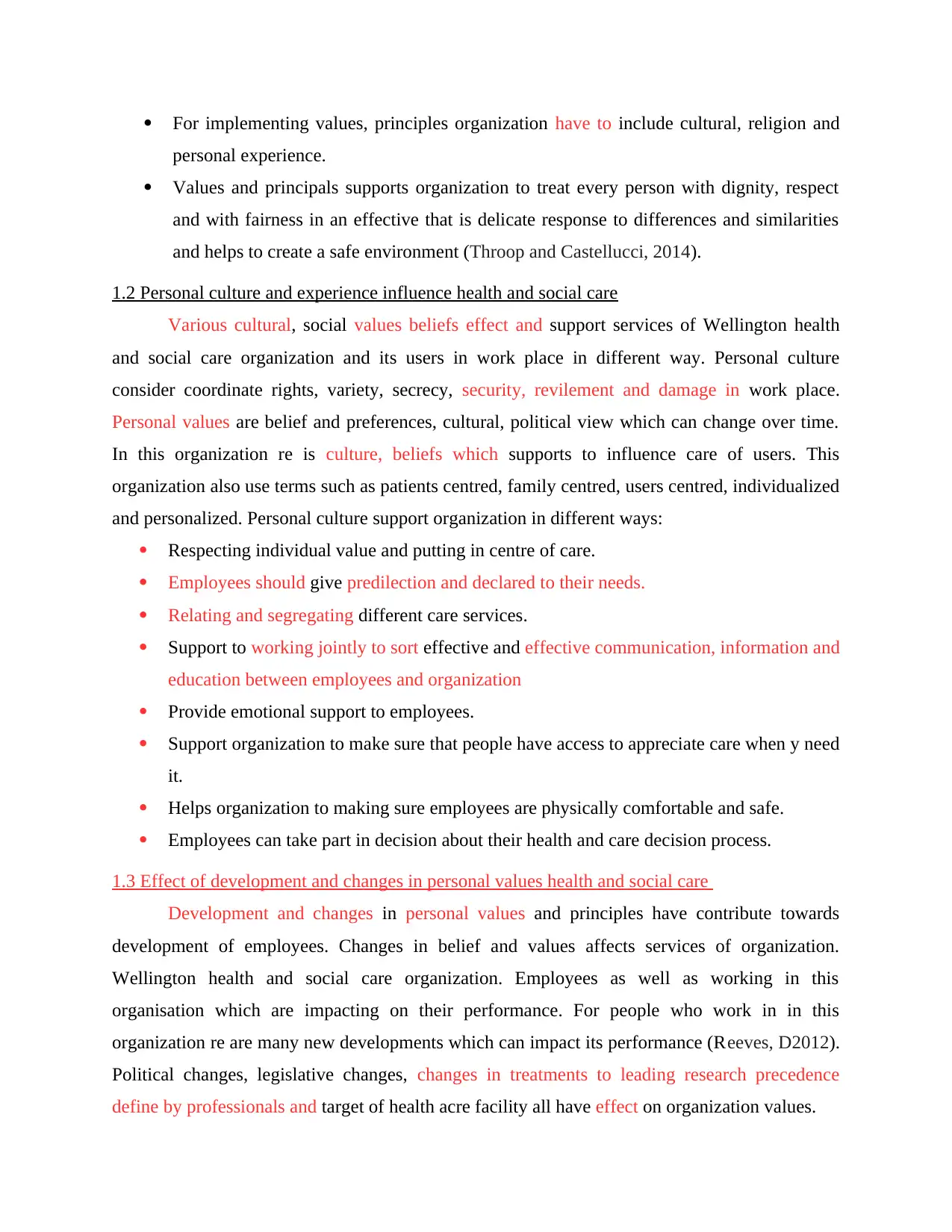
For implementing values, principles organization have to include cultural, religion and
personal experience.
Values and principals supports organization to treat every person with dignity, respect
and with fairness in an effective that is delicate response to differences and similarities
and helps to create a safe environment (Throop and Castellucci, 2014).
1.2 Personal culture and experience influence health and social care
Various cultural, social values beliefs effect and support services of Wellington health
and social care organization and its users in work place in different way. Personal culture
consider coordinate rights, variety, secrecy, security, revilement and damage in work place.
Personal values are belief and preferences, cultural, political view which can change over time.
In this organization re is culture, beliefs which supports to influence care of users. This
organization also use terms such as patients centred, family centred, users centred, individualized
and personalized. Personal culture support organization in different ways:
Respecting individual value and putting in centre of care.
Employees should give predilection and declared to their needs.
Relating and segregating different care services.
Support to working jointly to sort effective and effective communication, information and
education between employees and organization
Provide emotional support to employees.
Support organization to make sure that people have access to appreciate care when y need
it.
Helps organization to making sure employees are physically comfortable and safe.
Employees can take part in decision about their health and care decision process.
1.3 Effect of development and changes in personal values health and social care
Development and changes in personal values and principles have contribute towards
development of employees. Changes in belief and values affects services of organization.
Wellington health and social care organization. Employees as well as working in this
organisation which are impacting on their performance. For people who work in in this
organization re are many new developments which can impact its performance (Reeves, D2012).
Political changes, legislative changes, changes in treatments to leading research precedence
define by professionals and target of health acre facility all have effect on organization values.
personal experience.
Values and principals supports organization to treat every person with dignity, respect
and with fairness in an effective that is delicate response to differences and similarities
and helps to create a safe environment (Throop and Castellucci, 2014).
1.2 Personal culture and experience influence health and social care
Various cultural, social values beliefs effect and support services of Wellington health
and social care organization and its users in work place in different way. Personal culture
consider coordinate rights, variety, secrecy, security, revilement and damage in work place.
Personal values are belief and preferences, cultural, political view which can change over time.
In this organization re is culture, beliefs which supports to influence care of users. This
organization also use terms such as patients centred, family centred, users centred, individualized
and personalized. Personal culture support organization in different ways:
Respecting individual value and putting in centre of care.
Employees should give predilection and declared to their needs.
Relating and segregating different care services.
Support to working jointly to sort effective and effective communication, information and
education between employees and organization
Provide emotional support to employees.
Support organization to make sure that people have access to appreciate care when y need
it.
Helps organization to making sure employees are physically comfortable and safe.
Employees can take part in decision about their health and care decision process.
1.3 Effect of development and changes in personal values health and social care
Development and changes in personal values and principles have contribute towards
development of employees. Changes in belief and values affects services of organization.
Wellington health and social care organization. Employees as well as working in this
organisation which are impacting on their performance. For people who work in in this
organization re are many new developments which can impact its performance (Reeves, D2012).
Political changes, legislative changes, changes in treatments to leading research precedence
define by professionals and target of health acre facility all have effect on organization values.
Paraphrase This Document
Need a fresh take? Get an instant paraphrase of this document with our AI Paraphraser
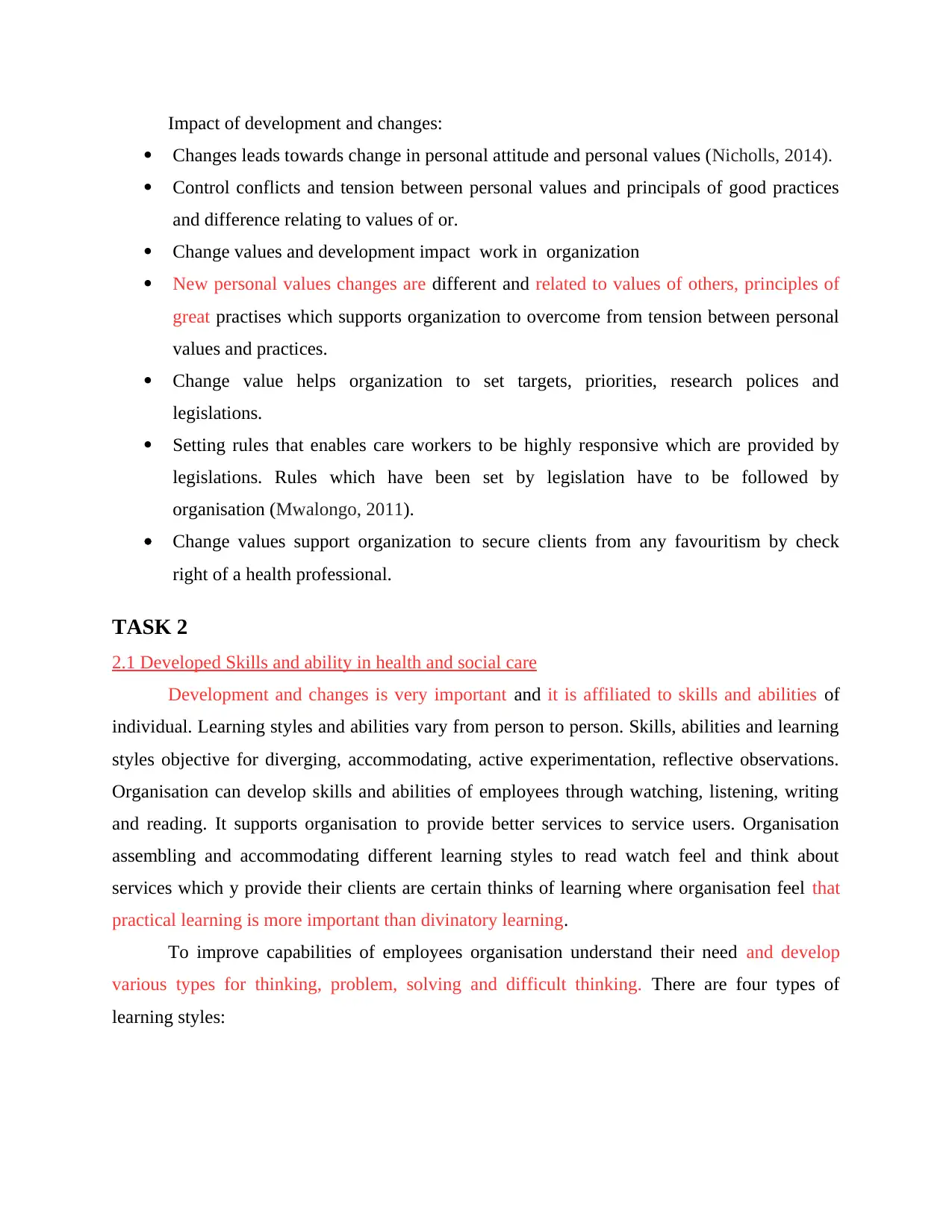
Impact of development and changes:
Changes leads towards change in personal attitude and personal values (Nicholls, 2014).
Control conflicts and tension between personal values and principals of good practices
and difference relating to values of or.
Change values and development impact work in organization
New personal values changes are different and related to values of others, principles of
great practises which supports organization to overcome from tension between personal
values and practices.
Change value helps organization to set targets, priorities, research polices and
legislations.
Setting rules that enables care workers to be highly responsive which are provided by
legislations. Rules which have been set by legislation have to be followed by
organisation (Mwalongo, 2011).
Change values support organization to secure clients from any favouritism by check
right of a health professional.
TASK 2
2.1 Developed Skills and ability in health and social care
Development and changes is very important and it is affiliated to skills and abilities of
individual. Learning styles and abilities vary from person to person. Skills, abilities and learning
styles objective for diverging, accommodating, active experimentation, reflective observations.
Organisation can develop skills and abilities of employees through watching, listening, writing
and reading. It supports organisation to provide better services to service users. Organisation
assembling and accommodating different learning styles to read watch feel and think about
services which y provide their clients are certain thinks of learning where organisation feel that
practical learning is more important than divinatory learning.
To improve capabilities of employees organisation understand their need and develop
various types for thinking, problem, solving and difficult thinking. There are four types of
learning styles:
Changes leads towards change in personal attitude and personal values (Nicholls, 2014).
Control conflicts and tension between personal values and principals of good practices
and difference relating to values of or.
Change values and development impact work in organization
New personal values changes are different and related to values of others, principles of
great practises which supports organization to overcome from tension between personal
values and practices.
Change value helps organization to set targets, priorities, research polices and
legislations.
Setting rules that enables care workers to be highly responsive which are provided by
legislations. Rules which have been set by legislation have to be followed by
organisation (Mwalongo, 2011).
Change values support organization to secure clients from any favouritism by check
right of a health professional.
TASK 2
2.1 Developed Skills and ability in health and social care
Development and changes is very important and it is affiliated to skills and abilities of
individual. Learning styles and abilities vary from person to person. Skills, abilities and learning
styles objective for diverging, accommodating, active experimentation, reflective observations.
Organisation can develop skills and abilities of employees through watching, listening, writing
and reading. It supports organisation to provide better services to service users. Organisation
assembling and accommodating different learning styles to read watch feel and think about
services which y provide their clients are certain thinks of learning where organisation feel that
practical learning is more important than divinatory learning.
To improve capabilities of employees organisation understand their need and develop
various types for thinking, problem, solving and difficult thinking. There are four types of
learning styles:
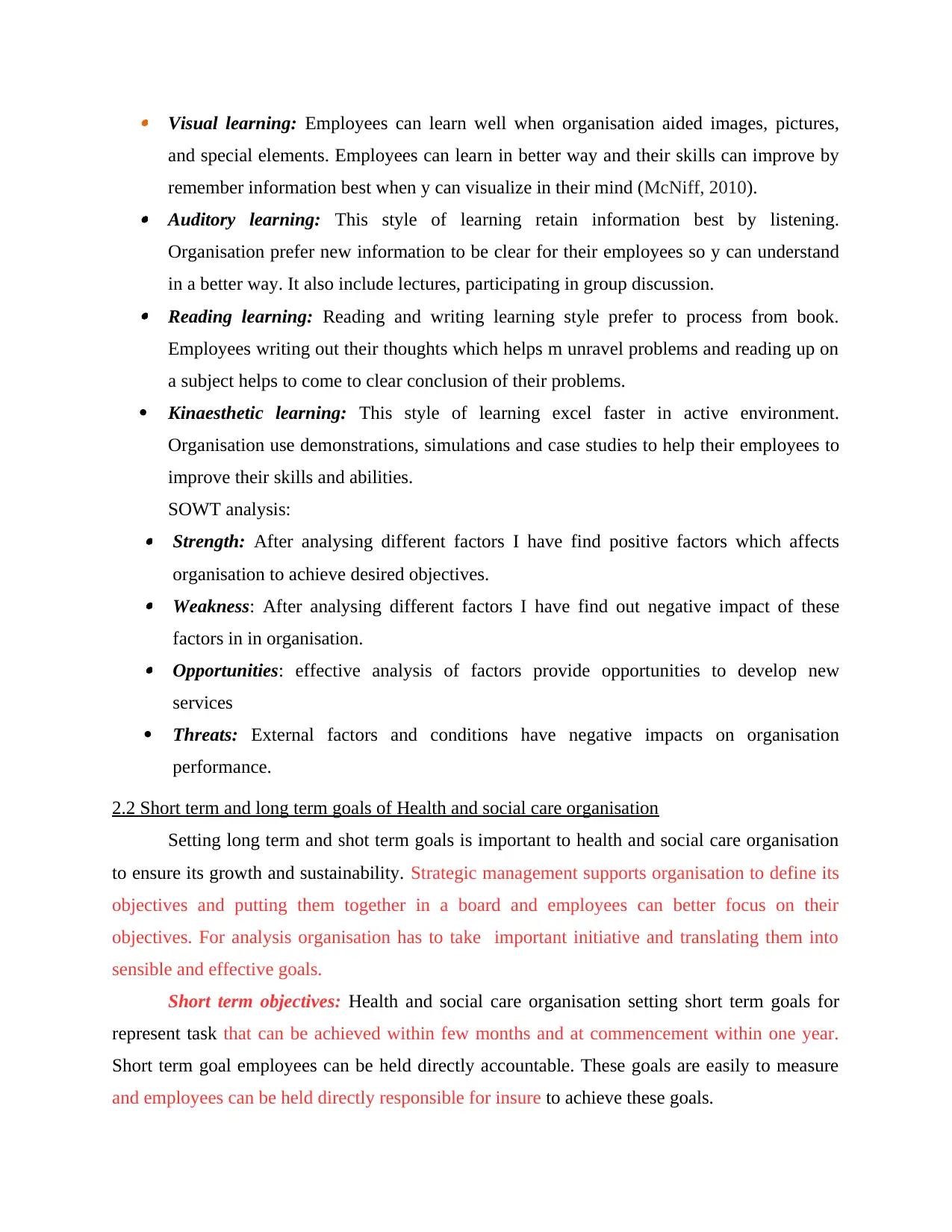
Visual learning: Employees can learn well when organisation aided images, pictures,
and special elements. Employees can learn in better way and their skills can improve by
remember information best when y can visualize in their mind (McNiff, 2010). Auditory learning: This style of learning retain information best by listening.
Organisation prefer new information to be clear for their employees so y can understand
in a better way. It also include lectures, participating in group discussion. Reading learning: Reading and writing learning style prefer to process from book.
Employees writing out their thoughts which helps m unravel problems and reading up on
a subject helps to come to clear conclusion of their problems.
Kinaesthetic learning: This style of learning excel faster in active environment.
Organisation use demonstrations, simulations and case studies to help their employees to
improve their skills and abilities.
SOWT analysis: Strength: After analysing different factors I have find positive factors which affects
organisation to achieve desired objectives. Weakness: After analysing different factors I have find out negative impact of these
factors in in organisation. Opportunities: effective analysis of factors provide opportunities to develop new
services
Threats: External factors and conditions have negative impacts on organisation
performance.
2.2 Short term and long term goals of Health and social care organisation
Setting long term and shot term goals is important to health and social care organisation
to ensure its growth and sustainability. Strategic management supports organisation to define its
objectives and putting them together in a board and employees can better focus on their
objectives. For analysis organisation has to take important initiative and translating them into
sensible and effective goals.
Short term objectives: Health and social care organisation setting short term goals for
represent task that can be achieved within few months and at commencement within one year.
Short term goal employees can be held directly accountable. These goals are easily to measure
and employees can be held directly responsible for insure to achieve these goals.
and special elements. Employees can learn in better way and their skills can improve by
remember information best when y can visualize in their mind (McNiff, 2010). Auditory learning: This style of learning retain information best by listening.
Organisation prefer new information to be clear for their employees so y can understand
in a better way. It also include lectures, participating in group discussion. Reading learning: Reading and writing learning style prefer to process from book.
Employees writing out their thoughts which helps m unravel problems and reading up on
a subject helps to come to clear conclusion of their problems.
Kinaesthetic learning: This style of learning excel faster in active environment.
Organisation use demonstrations, simulations and case studies to help their employees to
improve their skills and abilities.
SOWT analysis: Strength: After analysing different factors I have find positive factors which affects
organisation to achieve desired objectives. Weakness: After analysing different factors I have find out negative impact of these
factors in in organisation. Opportunities: effective analysis of factors provide opportunities to develop new
services
Threats: External factors and conditions have negative impacts on organisation
performance.
2.2 Short term and long term goals of Health and social care organisation
Setting long term and shot term goals is important to health and social care organisation
to ensure its growth and sustainability. Strategic management supports organisation to define its
objectives and putting them together in a board and employees can better focus on their
objectives. For analysis organisation has to take important initiative and translating them into
sensible and effective goals.
Short term objectives: Health and social care organisation setting short term goals for
represent task that can be achieved within few months and at commencement within one year.
Short term goal employees can be held directly accountable. These goals are easily to measure
and employees can be held directly responsible for insure to achieve these goals.
⊘ This is a preview!⊘
Do you want full access?
Subscribe today to unlock all pages.

Trusted by 1+ million students worldwide
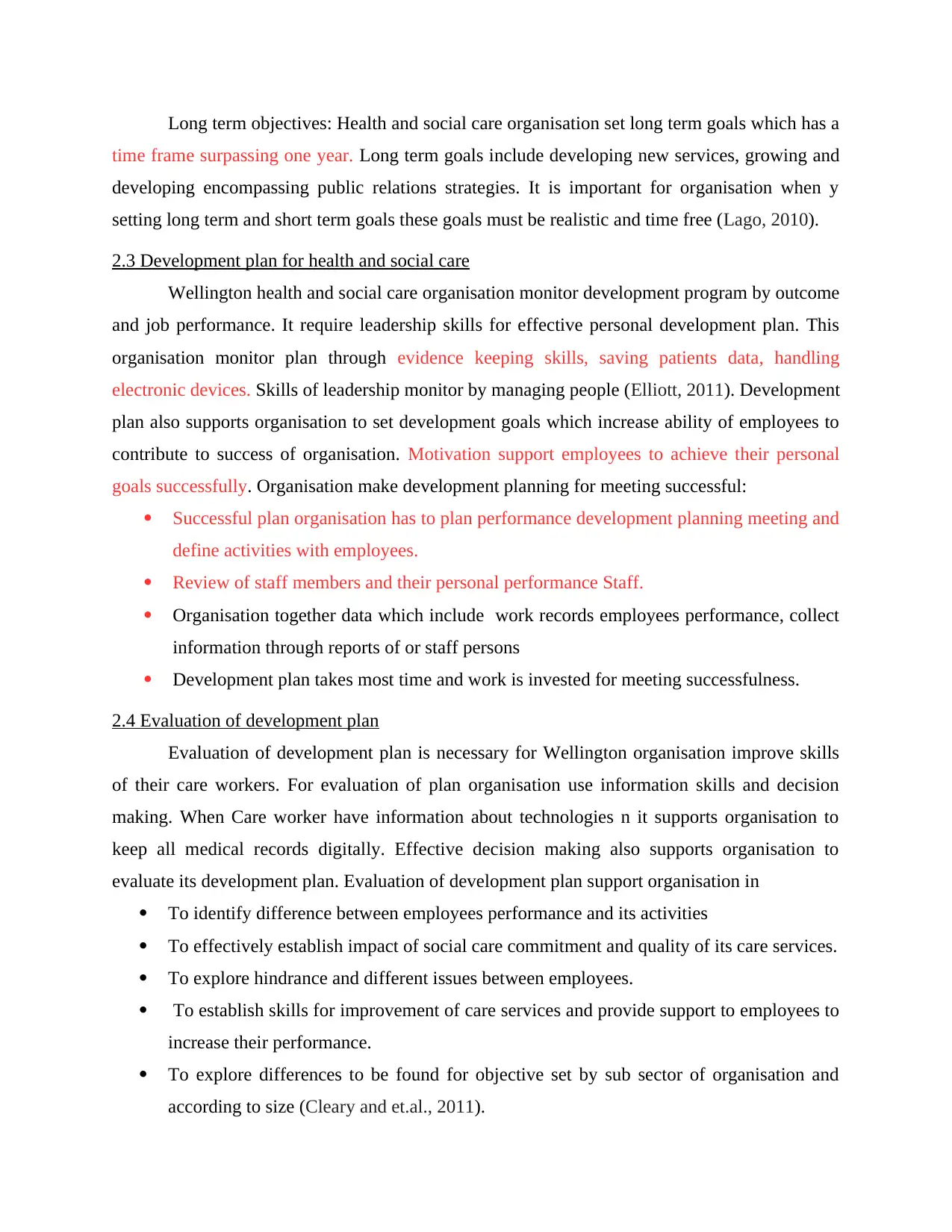
Long term objectives: Health and social care organisation set long term goals which has a
time frame surpassing one year. Long term goals include developing new services, growing and
developing encompassing public relations strategies. It is important for organisation when y
setting long term and short term goals these goals must be realistic and time free (Lago, 2010).
2.3 Development plan for health and social care
Wellington health and social care organisation monitor development program by outcome
and job performance. It require leadership skills for effective personal development plan. This
organisation monitor plan through evidence keeping skills, saving patients data, handling
electronic devices. Skills of leadership monitor by managing people (Elliott, 2011). Development
plan also supports organisation to set development goals which increase ability of employees to
contribute to success of organisation. Motivation support employees to achieve their personal
goals successfully. Organisation make development planning for meeting successful:
Successful plan organisation has to plan performance development planning meeting and
define activities with employees.
Review of staff members and their personal performance Staff.
Organisation together data which include work records employees performance, collect
information through reports of or staff persons
Development plan takes most time and work is invested for meeting successfulness.
2.4 Evaluation of development plan
Evaluation of development plan is necessary for Wellington organisation improve skills
of their care workers. For evaluation of plan organisation use information skills and decision
making. When Care worker have information about technologies n it supports organisation to
keep all medical records digitally. Effective decision making also supports organisation to
evaluate its development plan. Evaluation of development plan support organisation in
To identify difference between employees performance and its activities
To effectively establish impact of social care commitment and quality of its care services.
To explore hindrance and different issues between employees.
To establish skills for improvement of care services and provide support to employees to
increase their performance.
To explore differences to be found for objective set by sub sector of organisation and
according to size (Cleary and et.al., 2011).
time frame surpassing one year. Long term goals include developing new services, growing and
developing encompassing public relations strategies. It is important for organisation when y
setting long term and short term goals these goals must be realistic and time free (Lago, 2010).
2.3 Development plan for health and social care
Wellington health and social care organisation monitor development program by outcome
and job performance. It require leadership skills for effective personal development plan. This
organisation monitor plan through evidence keeping skills, saving patients data, handling
electronic devices. Skills of leadership monitor by managing people (Elliott, 2011). Development
plan also supports organisation to set development goals which increase ability of employees to
contribute to success of organisation. Motivation support employees to achieve their personal
goals successfully. Organisation make development planning for meeting successful:
Successful plan organisation has to plan performance development planning meeting and
define activities with employees.
Review of staff members and their personal performance Staff.
Organisation together data which include work records employees performance, collect
information through reports of or staff persons
Development plan takes most time and work is invested for meeting successfulness.
2.4 Evaluation of development plan
Evaluation of development plan is necessary for Wellington organisation improve skills
of their care workers. For evaluation of plan organisation use information skills and decision
making. When Care worker have information about technologies n it supports organisation to
keep all medical records digitally. Effective decision making also supports organisation to
evaluate its development plan. Evaluation of development plan support organisation in
To identify difference between employees performance and its activities
To effectively establish impact of social care commitment and quality of its care services.
To explore hindrance and different issues between employees.
To establish skills for improvement of care services and provide support to employees to
increase their performance.
To explore differences to be found for objective set by sub sector of organisation and
according to size (Cleary and et.al., 2011).
Paraphrase This Document
Need a fresh take? Get an instant paraphrase of this document with our AI Paraphraser
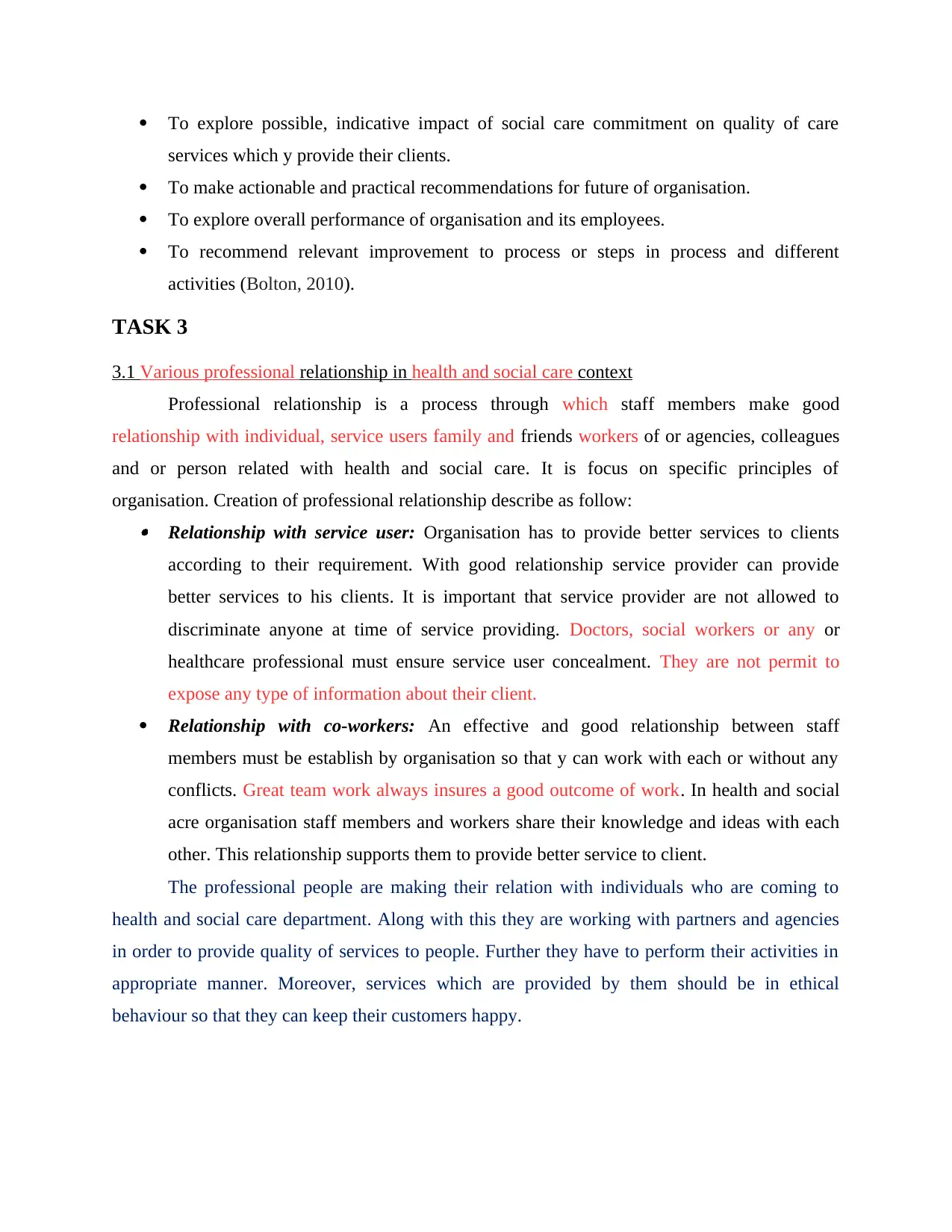
To explore possible, indicative impact of social care commitment on quality of care
services which y provide their clients.
To make actionable and practical recommendations for future of organisation.
To explore overall performance of organisation and its employees.
To recommend relevant improvement to process or steps in process and different
activities (Bolton, 2010).
TASK 3
3.1 Various professional relationship in health and social care context
Professional relationship is a process through which staff members make good
relationship with individual, service users family and friends workers of or agencies, colleagues
and or person related with health and social care. It is focus on specific principles of
organisation. Creation of professional relationship describe as follow: Relationship with service user: Organisation has to provide better services to clients
according to their requirement. With good relationship service provider can provide
better services to his clients. It is important that service provider are not allowed to
discriminate anyone at time of service providing. Doctors, social workers or any or
healthcare professional must ensure service user concealment. They are not permit to
expose any type of information about their client.
Relationship with co-workers: An effective and good relationship between staff
members must be establish by organisation so that y can work with each or without any
conflicts. Great team work always insures a good outcome of work. In health and social
acre organisation staff members and workers share their knowledge and ideas with each
other. This relationship supports them to provide better service to client.
The professional people are making their relation with individuals who are coming to
health and social care department. Along with this they are working with partners and agencies
in order to provide quality of services to people. Further they have to perform their activities in
appropriate manner. Moreover, services which are provided by them should be in ethical
behaviour so that they can keep their customers happy.
services which y provide their clients.
To make actionable and practical recommendations for future of organisation.
To explore overall performance of organisation and its employees.
To recommend relevant improvement to process or steps in process and different
activities (Bolton, 2010).
TASK 3
3.1 Various professional relationship in health and social care context
Professional relationship is a process through which staff members make good
relationship with individual, service users family and friends workers of or agencies, colleagues
and or person related with health and social care. It is focus on specific principles of
organisation. Creation of professional relationship describe as follow: Relationship with service user: Organisation has to provide better services to clients
according to their requirement. With good relationship service provider can provide
better services to his clients. It is important that service provider are not allowed to
discriminate anyone at time of service providing. Doctors, social workers or any or
healthcare professional must ensure service user concealment. They are not permit to
expose any type of information about their client.
Relationship with co-workers: An effective and good relationship between staff
members must be establish by organisation so that y can work with each or without any
conflicts. Great team work always insures a good outcome of work. In health and social
acre organisation staff members and workers share their knowledge and ideas with each
other. This relationship supports them to provide better service to client.
The professional people are making their relation with individuals who are coming to
health and social care department. Along with this they are working with partners and agencies
in order to provide quality of services to people. Further they have to perform their activities in
appropriate manner. Moreover, services which are provided by them should be in ethical
behaviour so that they can keep their customers happy.
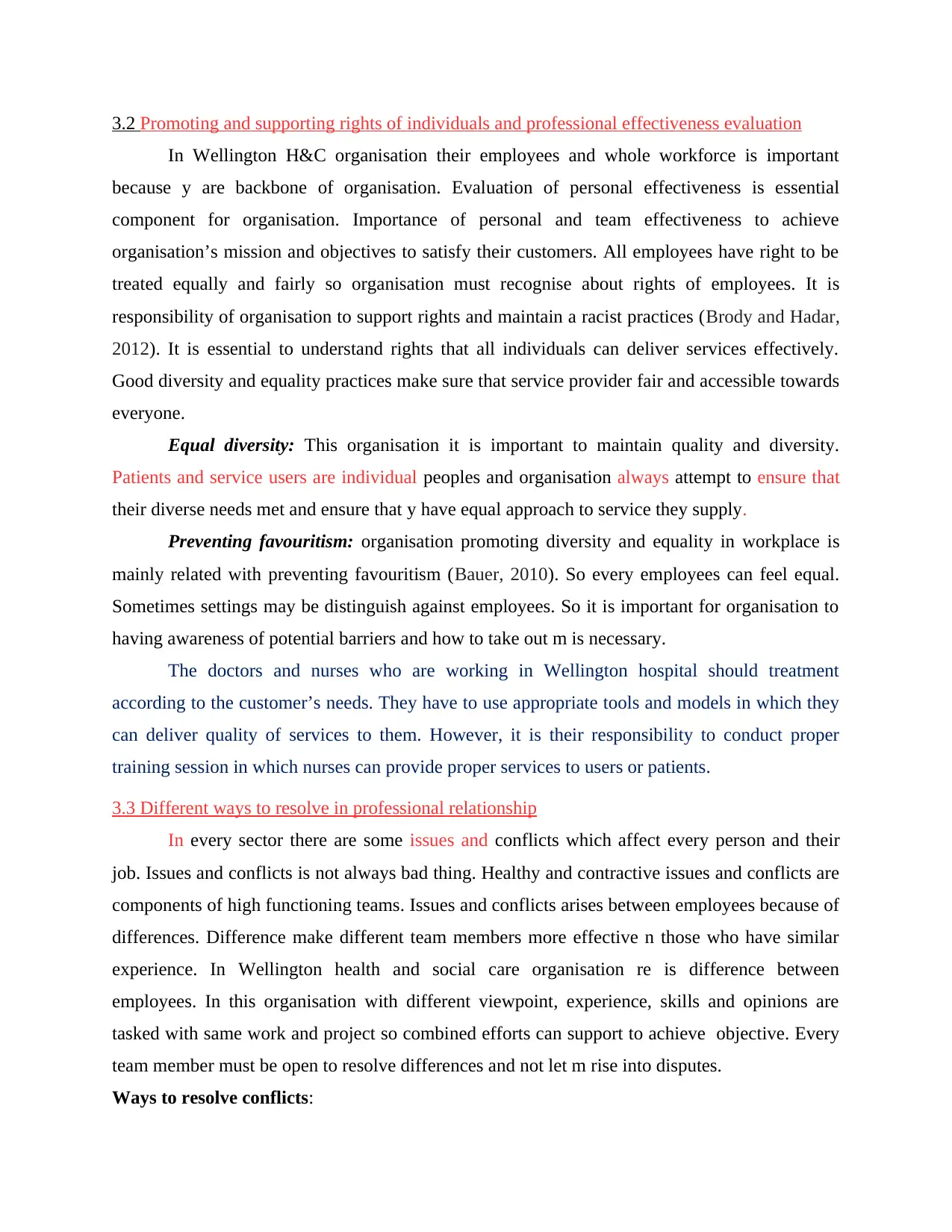
3.2 Promoting and supporting rights of individuals and professional effectiveness evaluation
In Wellington H&C organisation their employees and whole workforce is important
because y are backbone of organisation. Evaluation of personal effectiveness is essential
component for organisation. Importance of personal and team effectiveness to achieve
organisation’s mission and objectives to satisfy their customers. All employees have right to be
treated equally and fairly so organisation must recognise about rights of employees. It is
responsibility of organisation to support rights and maintain a racist practices (Brody and Hadar,
2012). It is essential to understand rights that all individuals can deliver services effectively.
Good diversity and equality practices make sure that service provider fair and accessible towards
everyone.
Equal diversity: This organisation it is important to maintain quality and diversity.
Patients and service users are individual peoples and organisation always attempt to ensure that
their diverse needs met and ensure that y have equal approach to service they supply.
Preventing favouritism: organisation promoting diversity and equality in workplace is
mainly related with preventing favouritism (Bauer, 2010). So every employees can feel equal.
Sometimes settings may be distinguish against employees. So it is important for organisation to
having awareness of potential barriers and how to take out m is necessary.
The doctors and nurses who are working in Wellington hospital should treatment
according to the customer’s needs. They have to use appropriate tools and models in which they
can deliver quality of services to them. However, it is their responsibility to conduct proper
training session in which nurses can provide proper services to users or patients.
3.3 Different ways to resolve in professional relationship
In every sector there are some issues and conflicts which affect every person and their
job. Issues and conflicts is not always bad thing. Healthy and contractive issues and conflicts are
components of high functioning teams. Issues and conflicts arises between employees because of
differences. Difference make different team members more effective n those who have similar
experience. In Wellington health and social care organisation re is difference between
employees. In this organisation with different viewpoint, experience, skills and opinions are
tasked with same work and project so combined efforts can support to achieve objective. Every
team member must be open to resolve differences and not let m rise into disputes.
Ways to resolve conflicts:
In Wellington H&C organisation their employees and whole workforce is important
because y are backbone of organisation. Evaluation of personal effectiveness is essential
component for organisation. Importance of personal and team effectiveness to achieve
organisation’s mission and objectives to satisfy their customers. All employees have right to be
treated equally and fairly so organisation must recognise about rights of employees. It is
responsibility of organisation to support rights and maintain a racist practices (Brody and Hadar,
2012). It is essential to understand rights that all individuals can deliver services effectively.
Good diversity and equality practices make sure that service provider fair and accessible towards
everyone.
Equal diversity: This organisation it is important to maintain quality and diversity.
Patients and service users are individual peoples and organisation always attempt to ensure that
their diverse needs met and ensure that y have equal approach to service they supply.
Preventing favouritism: organisation promoting diversity and equality in workplace is
mainly related with preventing favouritism (Bauer, 2010). So every employees can feel equal.
Sometimes settings may be distinguish against employees. So it is important for organisation to
having awareness of potential barriers and how to take out m is necessary.
The doctors and nurses who are working in Wellington hospital should treatment
according to the customer’s needs. They have to use appropriate tools and models in which they
can deliver quality of services to them. However, it is their responsibility to conduct proper
training session in which nurses can provide proper services to users or patients.
3.3 Different ways to resolve in professional relationship
In every sector there are some issues and conflicts which affect every person and their
job. Issues and conflicts is not always bad thing. Healthy and contractive issues and conflicts are
components of high functioning teams. Issues and conflicts arises between employees because of
differences. Difference make different team members more effective n those who have similar
experience. In Wellington health and social care organisation re is difference between
employees. In this organisation with different viewpoint, experience, skills and opinions are
tasked with same work and project so combined efforts can support to achieve objective. Every
team member must be open to resolve differences and not let m rise into disputes.
Ways to resolve conflicts:
⊘ This is a preview!⊘
Do you want full access?
Subscribe today to unlock all pages.

Trusted by 1+ million students worldwide
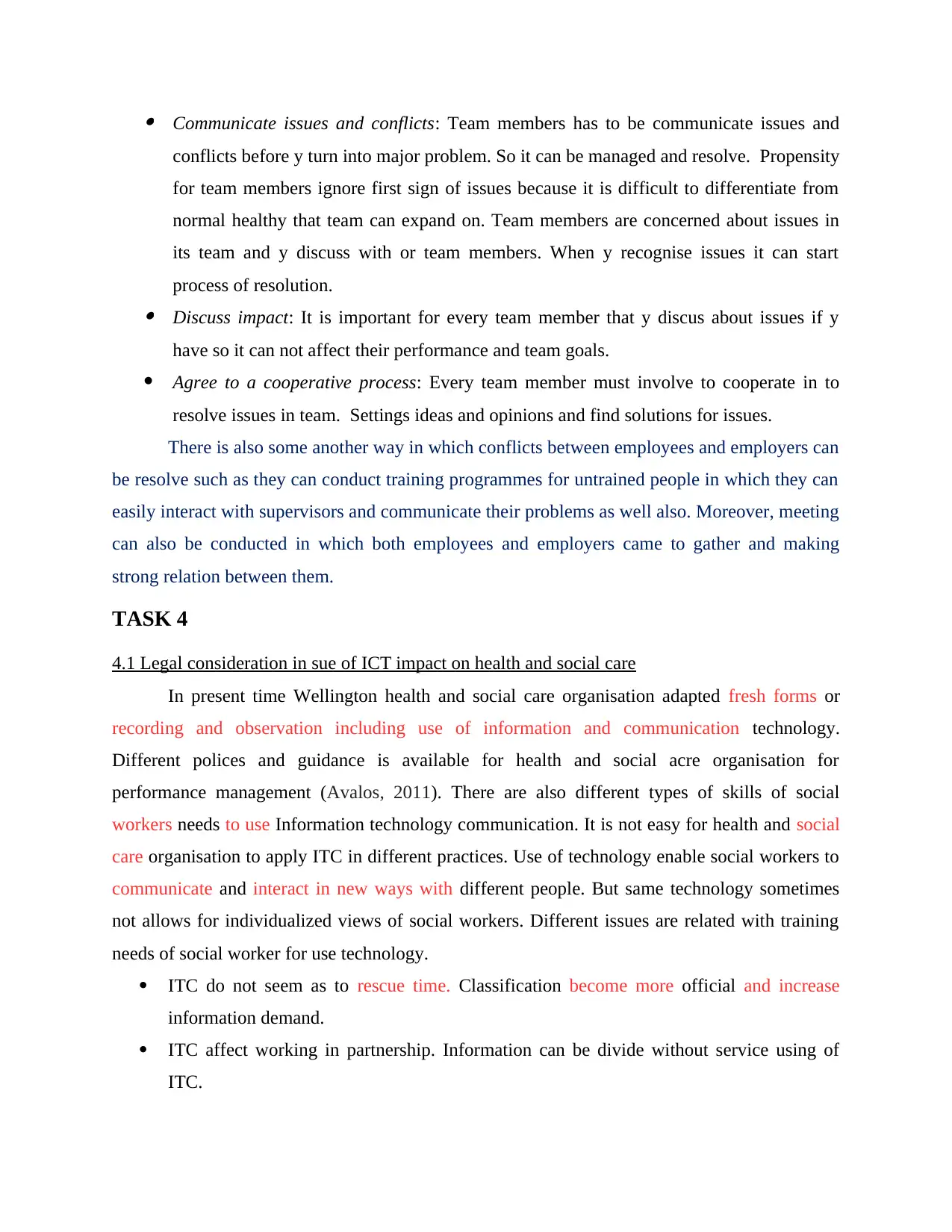
Communicate issues and conflicts: Team members has to be communicate issues and
conflicts before y turn into major problem. So it can be managed and resolve. Propensity
for team members ignore first sign of issues because it is difficult to differentiate from
normal healthy that team can expand on. Team members are concerned about issues in
its team and y discuss with or team members. When y recognise issues it can start
process of resolution. Discuss impact: It is important for every team member that y discus about issues if y
have so it can not affect their performance and team goals.
Agree to a cooperative process: Every team member must involve to cooperate in to
resolve issues in team. Settings ideas and opinions and find solutions for issues.
There is also some another way in which conflicts between employees and employers can
be resolve such as they can conduct training programmes for untrained people in which they can
easily interact with supervisors and communicate their problems as well also. Moreover, meeting
can also be conducted in which both employees and employers came to gather and making
strong relation between them.
TASK 4
4.1 Legal consideration in sue of ICT impact on health and social care
In present time Wellington health and social care organisation adapted fresh forms or
recording and observation including use of information and communication technology.
Different polices and guidance is available for health and social acre organisation for
performance management (Avalos, 2011). There are also different types of skills of social
workers needs to use Information technology communication. It is not easy for health and social
care organisation to apply ITC in different practices. Use of technology enable social workers to
communicate and interact in new ways with different people. But same technology sometimes
not allows for individualized views of social workers. Different issues are related with training
needs of social worker for use technology.
ITC do not seem as to rescue time. Classification become more official and increase
information demand.
ITC affect working in partnership. Information can be divide without service using of
ITC.
conflicts before y turn into major problem. So it can be managed and resolve. Propensity
for team members ignore first sign of issues because it is difficult to differentiate from
normal healthy that team can expand on. Team members are concerned about issues in
its team and y discuss with or team members. When y recognise issues it can start
process of resolution. Discuss impact: It is important for every team member that y discus about issues if y
have so it can not affect their performance and team goals.
Agree to a cooperative process: Every team member must involve to cooperate in to
resolve issues in team. Settings ideas and opinions and find solutions for issues.
There is also some another way in which conflicts between employees and employers can
be resolve such as they can conduct training programmes for untrained people in which they can
easily interact with supervisors and communicate their problems as well also. Moreover, meeting
can also be conducted in which both employees and employers came to gather and making
strong relation between them.
TASK 4
4.1 Legal consideration in sue of ICT impact on health and social care
In present time Wellington health and social care organisation adapted fresh forms or
recording and observation including use of information and communication technology.
Different polices and guidance is available for health and social acre organisation for
performance management (Avalos, 2011). There are also different types of skills of social
workers needs to use Information technology communication. It is not easy for health and social
care organisation to apply ITC in different practices. Use of technology enable social workers to
communicate and interact in new ways with different people. But same technology sometimes
not allows for individualized views of social workers. Different issues are related with training
needs of social worker for use technology.
ITC do not seem as to rescue time. Classification become more official and increase
information demand.
ITC affect working in partnership. Information can be divide without service using of
ITC.
Paraphrase This Document
Need a fresh take? Get an instant paraphrase of this document with our AI Paraphraser
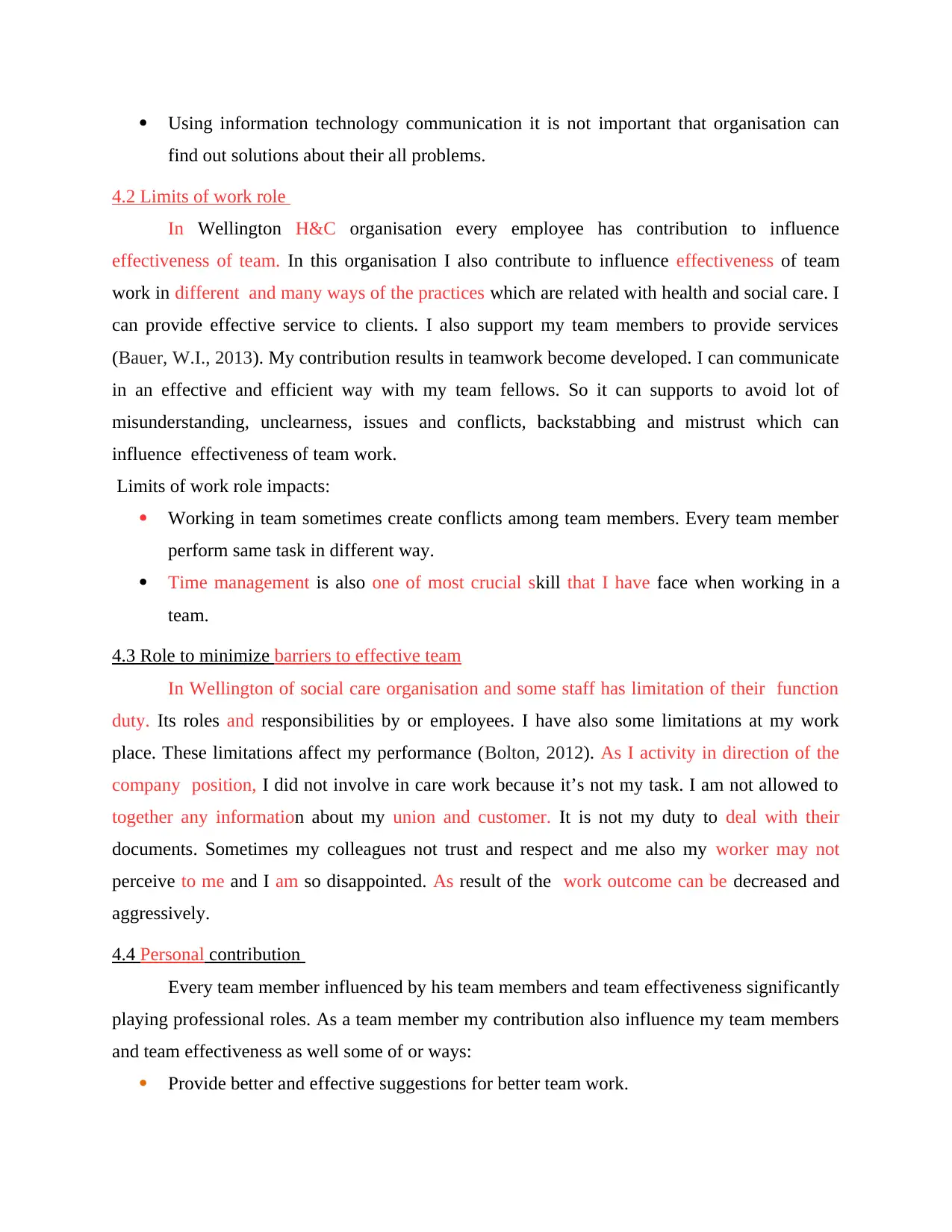
Using information technology communication it is not important that organisation can
find out solutions about their all problems.
4.2 Limits of work role
In Wellington H&C organisation every employee has contribution to influence
effectiveness of team. In this organisation I also contribute to influence effectiveness of team
work in different and many ways of the practices which are related with health and social care. I
can provide effective service to clients. I also support my team members to provide services
(Bauer, W.I., 2013). My contribution results in teamwork become developed. I can communicate
in an effective and efficient way with my team fellows. So it can supports to avoid lot of
misunderstanding, unclearness, issues and conflicts, backstabbing and mistrust which can
influence effectiveness of team work.
Limits of work role impacts:
Working in team sometimes create conflicts among team members. Every team member
perform same task in different way.
Time management is also one of most crucial skill that I have face when working in a
team.
4.3 Role to minimize barriers to effective team
In Wellington of social care organisation and some staff has limitation of their function
duty. Its roles and responsibilities by or employees. I have also some limitations at my work
place. These limitations affect my performance (Bolton, 2012). As I activity in direction of the
company position, I did not involve in care work because it’s not my task. I am not allowed to
together any information about my union and customer. It is not my duty to deal with their
documents. Sometimes my colleagues not trust and respect and me also my worker may not
perceive to me and I am so disappointed. As result of the work outcome can be decreased and
aggressively.
4.4 Personal contribution
Every team member influenced by his team members and team effectiveness significantly
playing professional roles. As a team member my contribution also influence my team members
and team effectiveness as well some of or ways:
Provide better and effective suggestions for better team work.
find out solutions about their all problems.
4.2 Limits of work role
In Wellington H&C organisation every employee has contribution to influence
effectiveness of team. In this organisation I also contribute to influence effectiveness of team
work in different and many ways of the practices which are related with health and social care. I
can provide effective service to clients. I also support my team members to provide services
(Bauer, W.I., 2013). My contribution results in teamwork become developed. I can communicate
in an effective and efficient way with my team fellows. So it can supports to avoid lot of
misunderstanding, unclearness, issues and conflicts, backstabbing and mistrust which can
influence effectiveness of team work.
Limits of work role impacts:
Working in team sometimes create conflicts among team members. Every team member
perform same task in different way.
Time management is also one of most crucial skill that I have face when working in a
team.
4.3 Role to minimize barriers to effective team
In Wellington of social care organisation and some staff has limitation of their function
duty. Its roles and responsibilities by or employees. I have also some limitations at my work
place. These limitations affect my performance (Bolton, 2012). As I activity in direction of the
company position, I did not involve in care work because it’s not my task. I am not allowed to
together any information about my union and customer. It is not my duty to deal with their
documents. Sometimes my colleagues not trust and respect and me also my worker may not
perceive to me and I am so disappointed. As result of the work outcome can be decreased and
aggressively.
4.4 Personal contribution
Every team member influenced by his team members and team effectiveness significantly
playing professional roles. As a team member my contribution also influence my team members
and team effectiveness as well some of or ways:
Provide better and effective suggestions for better team work.
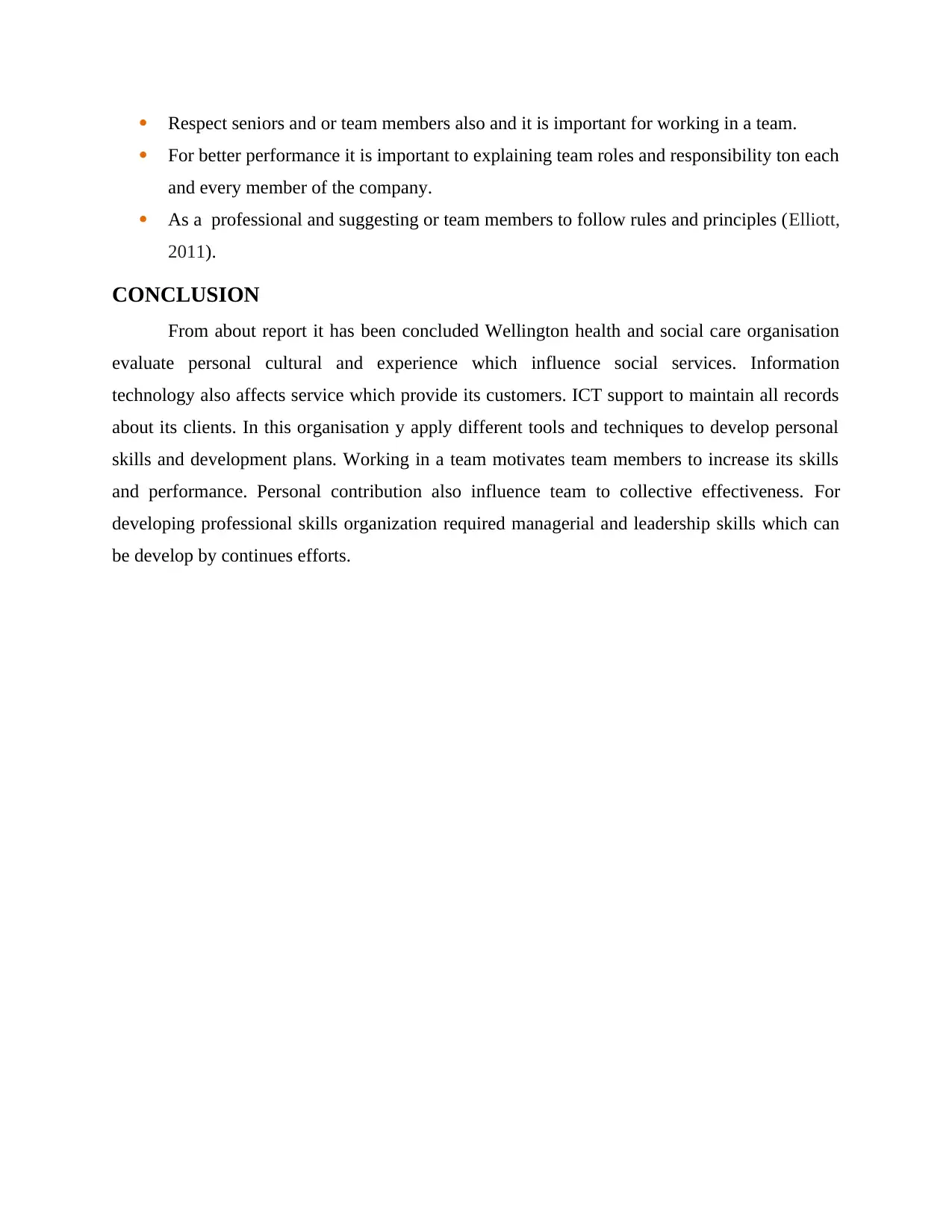
Respect seniors and or team members also and it is important for working in a team.
For better performance it is important to explaining team roles and responsibility ton each
and every member of the company.
As a professional and suggesting or team members to follow rules and principles (Elliott,
2011).
CONCLUSION
From about report it has been concluded Wellington health and social care organisation
evaluate personal cultural and experience which influence social services. Information
technology also affects service which provide its customers. ICT support to maintain all records
about its clients. In this organisation y apply different tools and techniques to develop personal
skills and development plans. Working in a team motivates team members to increase its skills
and performance. Personal contribution also influence team to collective effectiveness. For
developing professional skills organization required managerial and leadership skills which can
be develop by continues efforts.
For better performance it is important to explaining team roles and responsibility ton each
and every member of the company.
As a professional and suggesting or team members to follow rules and principles (Elliott,
2011).
CONCLUSION
From about report it has been concluded Wellington health and social care organisation
evaluate personal cultural and experience which influence social services. Information
technology also affects service which provide its customers. ICT support to maintain all records
about its clients. In this organisation y apply different tools and techniques to develop personal
skills and development plans. Working in a team motivates team members to increase its skills
and performance. Personal contribution also influence team to collective effectiveness. For
developing professional skills organization required managerial and leadership skills which can
be develop by continues efforts.
⊘ This is a preview!⊘
Do you want full access?
Subscribe today to unlock all pages.

Trusted by 1+ million students worldwide
1 out of 14
Related Documents
Your All-in-One AI-Powered Toolkit for Academic Success.
+13062052269
info@desklib.com
Available 24*7 on WhatsApp / Email
![[object Object]](/_next/static/media/star-bottom.7253800d.svg)
Unlock your academic potential
Copyright © 2020–2026 A2Z Services. All Rights Reserved. Developed and managed by ZUCOL.




